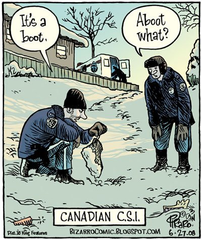Many Canadian dialect speakers sound no different from other North American English speakers. There is a stereotypical Canadian dialect, but the reality is that most Canadians don't have a Canadian accent. Dialect, maybe...
Canadian Dialect & Canadian Accent
The two words - dialect & accent - are often used interchangeably, even within the accent/dialect industry. I'm sometimes listed as the dialect coach when the only thing I worked on, technically, was the accent. Accent commonly refers to the sound changes, whereas dialect commonly refers to word choice and phrasing. The reality is that hardly anyone makes or cares about that distinction, though it may be useful to realize that difference here.

Sound changes in the stereotypical Canadian accent can be strong enough to easily stand out, though there are elements of it that carry into the northern parts of the US. The most extreme stereotypical Canadian change is the "oot and aboot" shift, sometimes referred to as "Canadian raising."
The reality of this sound change is that it really doesn't go anywhere near aboot. (It would be more accurate to represent it as aboat when the change is present and strong.) I have no idea where this stereotype came from, but I do know that many Canadians are downright offended by it.
The cartoon at the right is stupidly inaccurate and offensive as hell to some Canadians.
Personally, I love running the risk of exploring offensive humor, but unfortunately I haven't the same interest in stupid humor. They could have tied the joke in with a boat and it would have probably worked better. Though it would have also still been a really stupid cartoon. Are they truly meant to be funny, or just to take up space? Most of the time, I think it's a space thing - and a "collecting my paycheck" thing.
Canadian Accent
This out house about change to oat hoase aboat is the strongest Canadian accent element, and the one that is almost exclusively Canadian with less carry over into the northern US. I've had to give notes to some professional Canadian actors working in US productions when one of those words comes up. Usually Canadian actors know to watch for those and make the adjustment, if they even still have to think it through.
Beyond that, hardly any accent-related sound changes make most Canadians sound Canadian. They sound North American.
This is part of why there is so much "Hollywood" filmmaking north of the border these days. The strong Canadian accent changes cause the second half of the diphthongs to drop away in words like oh no don't go and in lazy hazy crazy days. Most Canadians, however, don't make these stronger changes - especially Canadians who are urban dwellers in the south.
Keep in mind that most Canadians are urban dwellers in the south. (see the map at the left)
This is why most Canadians don't have a Canadian accent - or at least a stereotypical Canadian accent or a distinctly Canadian accent.
Canadian Dialect
The dialect can be different, though. There are a lot of words that Canadians use that are not the most commonly used words for Americans who live only an hour away.
There is, of course, the stereotypical eh? that so many Canadians slip in without even realizing it. During a recent trip to Canada for dialect recordings, a man I was interviewing from Vancouver said that he didn't "say eh very often, eh?" and didn't even realize that he'd done it! Happily his wife was present to point it out to him and to let him know that he actually says it quite a bit. I'm still curious about who slept on the couch that evening...
There are a lot of words that Canadians use that will strike more Americans as being rather British sounding: Washroom instead of bathroom or toilet. Knapsack instead of backpack. Chocolate bar instead of candy bar. Runners rather than sneakers. House coat instead of robe. Bum or even arse for butt. Holiday instead of vacation. There's also a lot of spelling that would strike Americans as rather British: colour, centre, defence, and travelled. Some pronunciations are more British than American: Adult instead of aDULT, syrup is "seerup" instead of "surup," and schedule is "shedjewl" instead of "skedjewl."
Speaking with a Canadian Accent - Canadian Dialect
Most actors are provided with a script, so the Canadian dialect aspect isn't much of an issue - whether you're learning to do it or learning to shift it to something else. And as it turns out, the Canadian accent isn't that big of a deal for many Canadians, either. Just don't call a Canadian an American. You may find out how Canadians fight.
Side note: There are other Canadian accents as well, such as French-Canadian accents, and those of the east coast.







